
Part Four:Writing and Translation>>Translation Return Knowing About Translation 否定句的翻译 f云后a信行行台后行后台台台后日台6行后而台行行后行台云台信台行行面台行台云行需台台云台台台云行云雷雷行言首台后首后云台气, 英语的否定结构较为复杂,有一系列表示否定概念的语 言规则,无论是在用词、语法,还是在逻辑关系上,英语和汉: :语的表达习惯都有所差异。因此,在英汉互译时,要根据两种 语言否定结构的特点,正确理解原文,才能翻译正确。主要分 :为以下几种情形: 1.全部否定 2.部分否定 3.双重否定句 4.表示肯定意义的否定句
Knowing About Translation Part Four: Writing and Translation >> Translation 英语的否定结构较为复杂,有一系列表示否定概念的语 言规则,无论是在用词、语法,还是在逻辑关系上,英语和汉 语的表达习惯都有所差异。因此,在英汉互译时,要根据两种 语言否定结构的特点,正确理解原文,才能翻译正确。主要分 为以下几种情形: 1. 全部否定 2. 部分否定 3. 双重否定句 4. 表示肯定意义的否定句 否定句的翻译
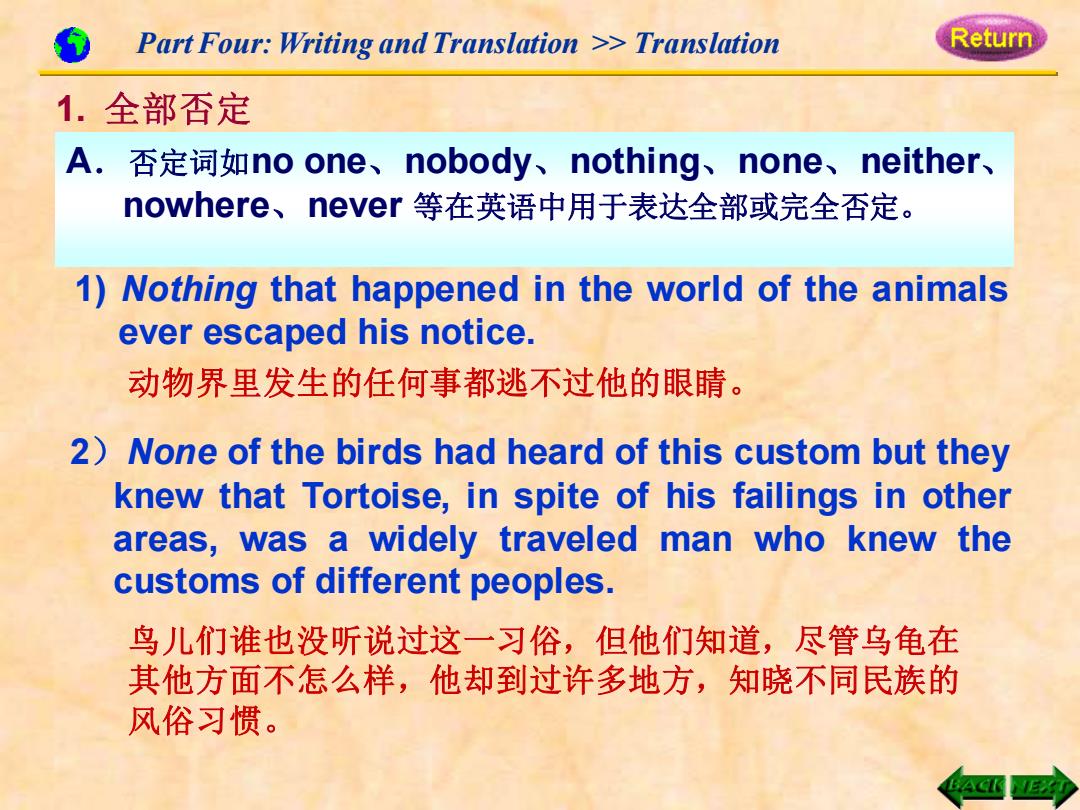
Part Four:Writing and Translation >Translation Return 1.全部否定 A.否定词如no one、nobody、nothing、none、neither、 nowhere、never等在英语中用于表达全部或完全否定。 1)Nothing that happened in the world of the animals ever escaped his notice. 动物界里发生的任何事都逃不过他的眼睛。 2)None of the birds had heard of this custom but they knew that Tortoise,in spite of his failings in other areas,was a widely traveled man who knew the customs of different peoples. 鸟儿们谁也没听说过这一习俗,但他们知道,尽管乌龟在 其他方面不怎么样,他却到过许多地方,知晓不同民族的 风俗习惯
Part Four: Writing and Translation >> Translation 1) Nothing that happened in the world of the animals ever escaped his notice. 动物界里发生的任何事都逃不过他的眼睛。 2)None of the birds had heard of this custom but they knew that Tortoise, in spite of his failings in other areas, was a widely traveled man who knew the customs of different peoples. 鸟儿们谁也没听说过这一习俗,但他们知道,尽管乌龟在 其他方面不怎么样,他却到过许多地方,知晓不同民族的 风俗习惯。 1. 全部否定 A.否定词如no one、nobody、nothing、none、neither、 nowhere、never 等在英语中用于表达全部或完全否定
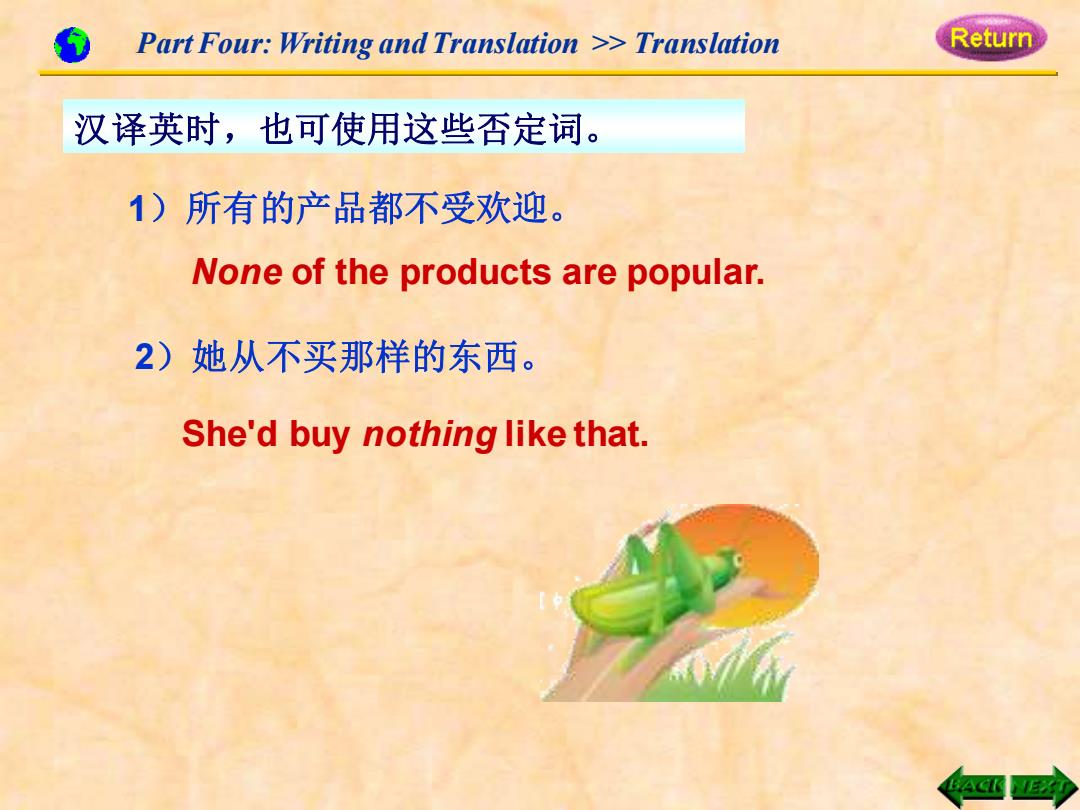
Part Four:Writing and Translation >Translation Return 汉译英时,也可使用这些否定词。 1)所有的产品都不受欢迎。 None of the products are popular. 2)她从不买那样的东西。 She'd buy nothing like that
Part Four: Writing and Translation >> Translation 汉译英时,也可使用这些否定词。 1)所有的产品都不受欢迎。 None of the products are popular. 2)她从不买那样的东西。 She'd buy nothing like that
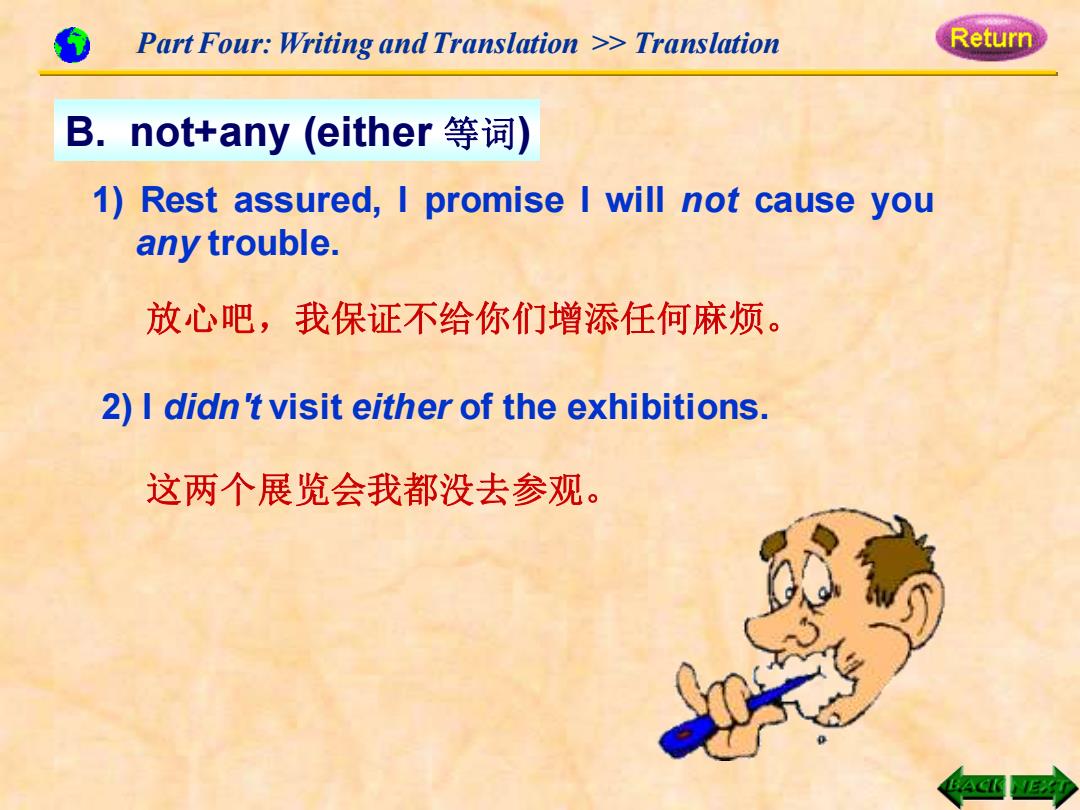
Part Four:Writing and Translation >Translation Return B.not+any(either等词) 1)Rest assured,I promise I will not cause you any trouble. 放心吧,我保证不给你们增添任何麻烦。 2)I didn't visit either of the exhibitions. 这两个展览会我都没去参观
Part Four: Writing and Translation >> Translation 1) Rest assured, I promise I will not cause you any trouble. 放心吧,我保证不给你们增添任何麻烦。 2) I didn't visit either of the exhibitions. 这两个展览会我都没去参观。 B. not+any (either 等词)
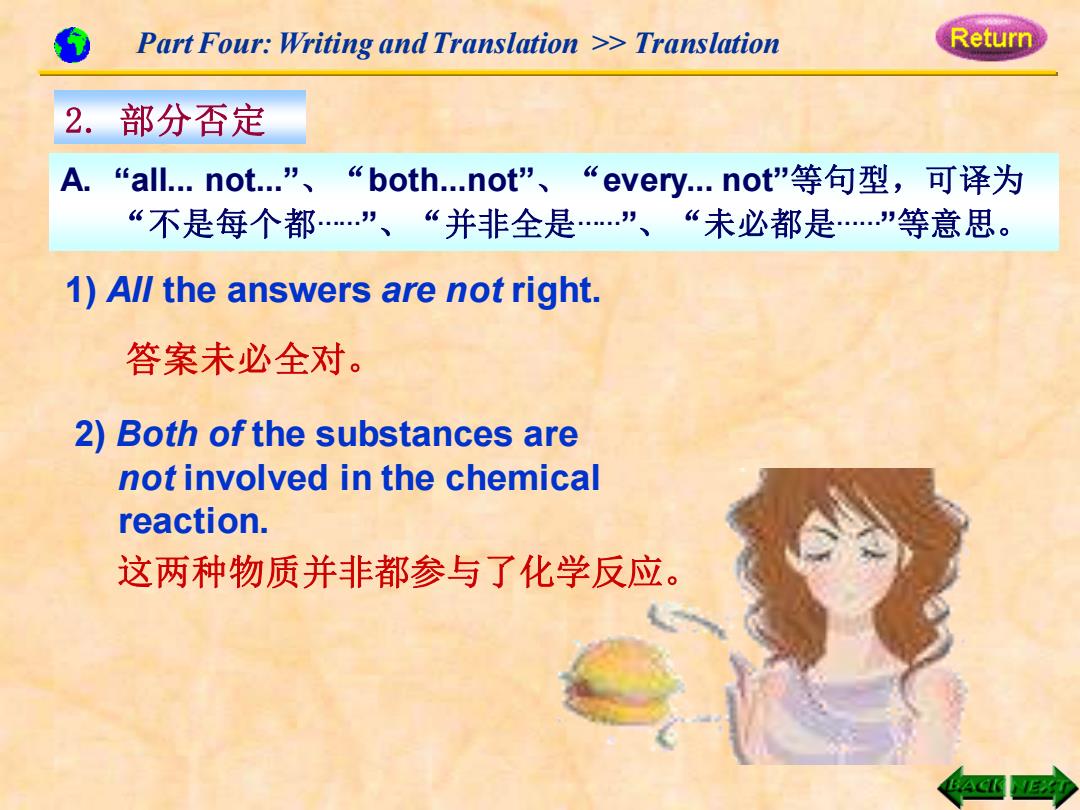
Part Four:Writing and Translation >Translation Return 2.部分否定 A. all.not”、“both...not'”、“every..not”等句型,可译为 “不是每个都…”、“并非全是…”、“未必都是…”等意思。 1)All the answers are not right. 答案未必全对。 2)Both of the substances are not involved in the chemical reaction. 这两种物质并非都参与了化学反应
Part Four: Writing and Translation >> Translation 1) All the answers are not right. 答案未必全对。 2) Both of the substances are not involved in the chemical reaction. 这两种物质并非都参与了化学反应。 2. 部分否定 A. “all... not...”、“both...not”、“every... not”等句型,可译为 “不是每个都……”、“并非全是……”、“未必都是……”等意思

Part Four:Writing and Translation >Translation Return B.“not all.”、“not every.”、“not both.."等句型,可 译为“不是所有的…都…”、“不是每个…都”。 1)Not all people can solve the problem. 不是所有的人都能解决这个问题。 2)Not al/the children like swimming. 不是每个孩子都喜欢游泳。 c.主语+not+all(both,every,always.),可译为“并不是 都…”、“不都…”、“并非总是…等意思。 1)I don't know both of the students. 这两位同学我并不都认识。 2)He doesn't know everything about me. 他并不了解我的全部情况
Part Four: Writing and Translation >> Translation 1) Not all people can solve the problem. 不是所有的人都能解决这个问题。 2) Not all the children like swimming. 不是每个孩子都喜欢游泳。 B. “not all...”、“not every...”、“not both...”等句型,可 译为“不是所有的……都……”、“不是每个……都……” 。 C. 主语+not+all (both,every,always...),可译为“并不是 都……”、“不都……”、“并非总是……”等意思。 1) I don't know both of the students. 这两位同学我并不都认识。 2) He doesn't know everything about me. 他并不了解我的全部情况
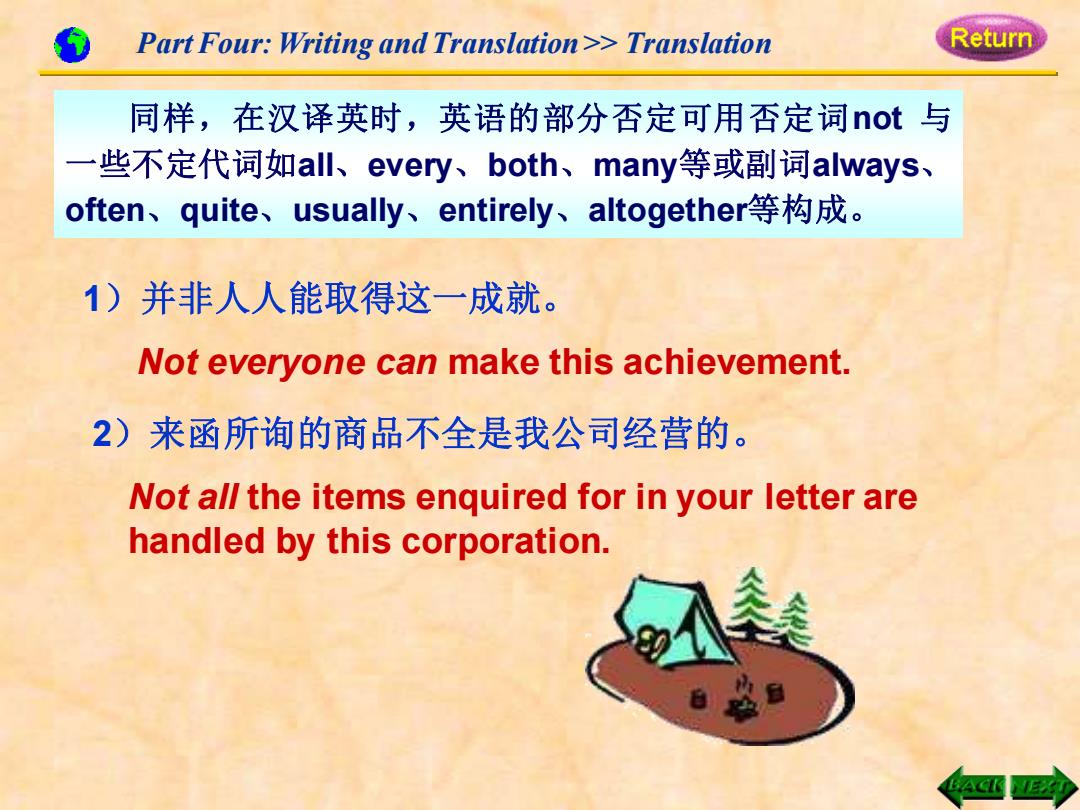
Part Four:Writing and Translation>>Translation Return 同样,在汉译英时,英语的部分否定可用否定词not与 一些不定代词如all、evey、both、many等或副词always、 often、.quite、usually、entirely、altogether等构成。 1)并非人人能取得这一成就。 Not everyone can make this achievement. 2)来函所询的商品不全是我公司经营的。 Not all the items enquired for in your letter are handled by this corporation
Part Four: Writing and Translation >> Translation 2)来函所询的商品不全是我公司经营的。 Not all the items enquired for in your letter are handled by this corporation. 1)并非人人能取得这一成就。 Not everyone can make this achievement. 同样,在汉译英时,英语的部分否定可用否定词not 与 一些不定代词如all、every、both、many等或副词always、 often、quite、usually、entirely、altogether等构成
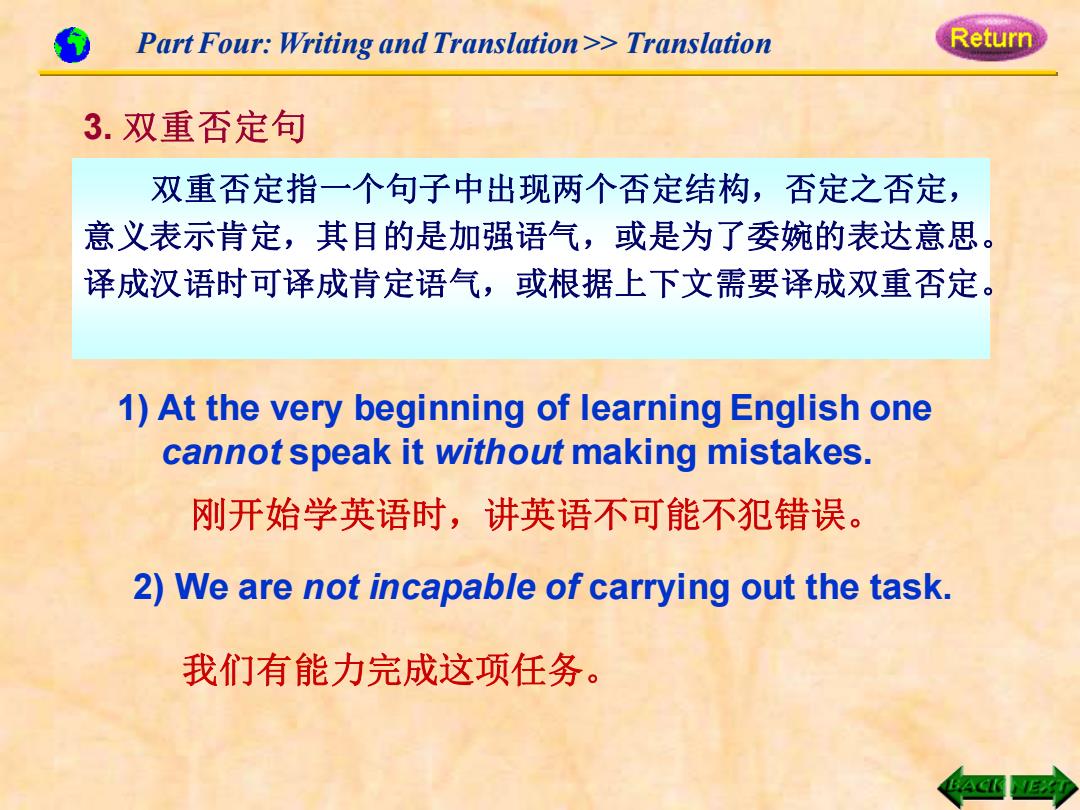
Part Four:Writing and Translation >Translation Return 3.双重否定句 双重否定指一个句子中出现两个否定结构,否定之否定, 意义表示肯定,其目的是加强语气,或是为了委婉的表达意思。 译成汉语时可译成肯定语气,或根据上下文需要译成双重否定 1)At the very beginning of learning English one cannot speak it without making mistakes. 刚开始学英语时,讲英语不可能不犯错误。 2)We are not incapable of carrying out the task. 我们有能力完成这项任务
Part Four: Writing and Translation >> Translation 3. 双重否定句 双重否定指一个句子中出现两个否定结构,否定之否定, 意义表示肯定,其目的是加强语气,或是为了委婉的表达意思。 译成汉语时可译成肯定语气,或根据上下文需要译成双重否定。 1) At the very beginning of learning English one cannot speak it without making mistakes. 刚开始学英语时,讲英语不可能不犯错误。 2) We are not incapable of carrying out the task. 我们有能力完成这项任务
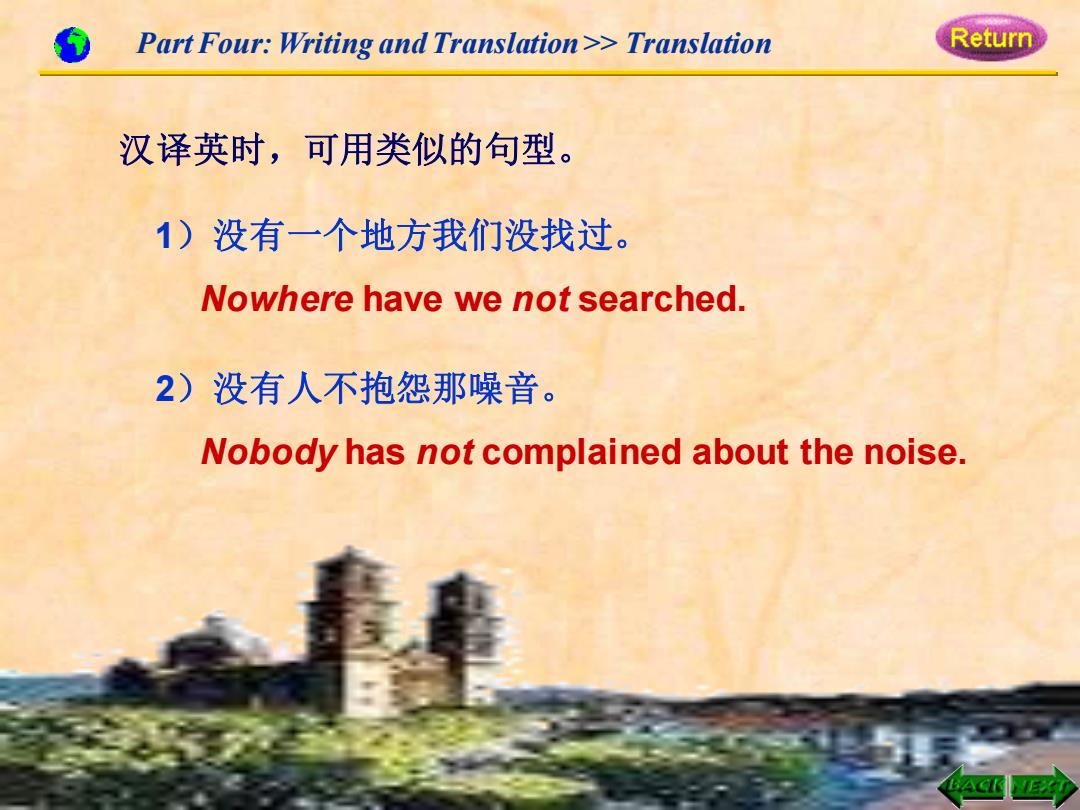
Part Four:Writing and Translation >Translation Return 汉译英时,可用类似的句型。 1)没有一个地方我们没找过。 Nowhere have we not searched. 2)没有人不抱怨那噪音。 Nobody has not complained about the noise
Part Four: Writing and Translation >> Translation 汉译英时,可用类似的句型。 1)没有一个地方我们没找过。 Nowhere have we not searched. 2)没有人不抱怨那噪音。 Nobody has not complained about the noise

Part Four:Writing and Translation >Translation Return 4.表示肯定意义的否定句 有些英文原文,形式上使用了某些否定词,但其意 义是肯定的,翻译时要注意翻译准确。 1)He wouldn't feel better. 他感觉好极了。 2)I couldn't agree with you more. 我完全赞同你的意见
Part Four: Writing and Translation >> Translation 4.表示肯定意义的否定句 有些英文原文,形式上使用了某些否定词,但其意 义是肯定的,翻译时要注意翻译准确。 1) He wouldn't feel better. 他感觉好极了。 2) I couldn't agree with you more. 我完全赞同你的意见